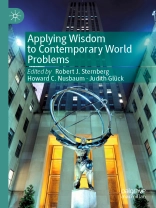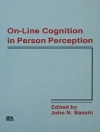This book presents perspectives from world experts in the field of wisdom studies to propose how wisdom can provide the foundation upon which solutions to social and global problems can be grounded. The authors argue that where society has come to rely on leaders with skills relating to knowledge and intelligence; instead we should focus on wisdom-based acumen for our leaders in government, business, and the military.
In this book the authors offer evidence-based definitions of wisdom and apply these to world problems they believe could potentially be solved using wise solutions. Among the case studies confronted are terrorism and war, poverty and economic disparity, climate change, increasing antibiotic resistance and political corruption.
Focusing on the cognitive, social and emotional processes involved in everyday decision-making, this book presents a compelling argument for the application of wise problem-solving to complex world issues that will appeal in particular to those in leadership, teaching and policy roles, and open new pathways in the fields of wisdom-studies, psychology, sociology and political theory.
Innehållsförteckning
1. Where Have All the Flowers of Wisdom Gone? — An Analysis of Teaching for Wisdom Over the Years; Robert J. Sternberg.- 2. The Erosion of Democracy: Can We Muster Enough Wisdom to Stop It?; Don Ambrose.- 3. Wise Reasoning in an Uncertain World; Igor Grossmann & Anna Dorfman.- 4. Wisdom vs. Populism and Polarization: Learning to Regulate Our Evolved Intuitions; Judith Glück.- 5. The Breakdown of Civic Virtues and the Problem of Hate Speech: Is There Wisdom in Freedom of Speech?; Howard C. Nusbaum.- 6. “Hate Begets Hate; Violence Begets Violence”: A Wisdom-based Analysis of Contemporary Social Activism; Nic M. Weststrate.- 7. Wisdom and Moral Exemplars; Megan Mischinski & Eranda Jayawickreme.- 8. Practical Wisdom in Islamic law: From the Local to the Global; Tom Woerner-Powell & Ricca Edmondson.- 9. Can Wisdom be Helpful?; Ursula M. Staudinger.- 10. Wisdom in the Workplace; Hannes Zacher & Ute Kunzmann.- 11. The Practical Applications of Self-Transcendent Wisdom; Carolyn M. Aldwin & Michael R. Levenson.- 12. Vedanta Philosophy’s Contribution to Wisdom Development for Leadership: Grounding Indian Practical Wisdom in Higher Knowledge and Purpose; Surya Tahora, Snehal Shah, & David Rooney.- 13. How Wisdom Can Help Solve Global Problems; Nicholas Maxwell.- 14. Practical Wisdom and Health Care; Barry Schwartz & Kenneth E. Sharpe.- 15. Seeking Wisdom: A Physician’s Journey in the Wake of ‘Charlottesville’; Margaret Plews-Ogan.- 16. Not Today, and Probably Not Tomorrow Either: Obstacles to Wisdom and How We May Overcome Them; Judith Glück, Robert J. Sternberg, & Howard C. Nusbaum.
Om författaren
Robert J. Sternberg is Professor of Human Development, Cornell University, USA and Honorary Professor of Psychology, University of Heidelberg, Germany. His Ph D is from Stanford and he holds 13 honorary doctorates. Sternberg has won the Grawemeyer Award in Psychology and the William James and James Mc Keen Cattell Awards from the APS.
Howard Nusbaum is the Stella M. Rowley Professor of Psychology at the University of Chicago, USA and is currently Director of the Center for Practical Wisdom. He was Division Director for Behavioral and Cognitive Sciences at the NSF from 2015 to 2017. He studies communication, learning, and wise reasoning.
Judith Glück is Professor of Developmental Psychology at the University of Klagenfurt, Austria. She previously worked at University of Vienna and the Max Planck Institute for Human Development in Berlin. Her research investigates the definition, development, and measurement of wisdom. She is co-editor of the Cambridge Handbook of Wisdom.












